HTC and the Little Rock Nine
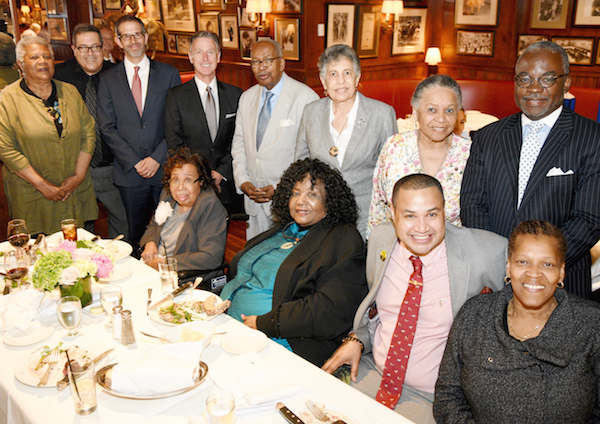
“This year marks the 60th anniversary of our union honoring the Little Rock Nine — a group of incredibly brave students who were the center of the battle to desegregate Central High School in Little Rock, Arkansas, and who even today serve as an enduring symbol of the courage and resolve of the civil rights movement and the fight for equality.”
Those were the words of Hotel Trades Council President Peter Ward, on Tuesday, June 12, when the ties between our union and the Little Rock Nine officially spanned 60 years at a luncheon held in Gallagher’s Steak House. Six of the eight surviving members of the Little Rock Nine attended the event, along with a number of their family members. The Little Rock Nine members who were present were Ernest Green, Minnijean Brown Trickey, Carlotta Walls LaNier, Gloria Ray Karlmark, Thelma Mothershed-Wair and Melba Pattillo Beals.
The drive to integrate Central High School in Little Rock took root in the years after the Supreme Court’s Brown vs. Board of Education decision. There was fierce and angry opposition to this effort, led by the Governor of Arkansas himself, Orville Faubus. There were taunts, there were threats, there was physical violence. But there were nine incredibly courageous students that were determined to exercise their constitutional right to an education, and there is no one who can deny that all of us are better off because they did so.
In 1958, 20 years after its founding, our union was fighting side by side with the civil rights movement. We participated in rallies and boycotts. We made strong financial contributions to groups like the NAACP and the Southern Christian Leadership Conference. And we established an annual award for those who helped propel the civil rights movement forward.
Among those our union recognized with this annual award were A. Phillip Randolph, James Meredith, the Reverend Martin Luther King, Jr. (twice) and, in 1958, the nine brave students who became known as the Little Rock Nine.
Our union brought the students to New York and hosted them for a time on the town. Later, the union found summer jobs for several of the students, including Ernest Green, who later served as an Assistant Secretary of Labor during the Jimmy Carter administration, and Carlotta Walls LaNier, the author of “A Mighty Long Way.”
“Our entire union is pleased to welcome you back to New York,” Ward said, in speaking at the luncheon. “We salute the remarkable courage you displayed as teenagers in an environment made hostile by people who can only be described as ignorant.”
Ward said the bravery displayed by the Little Rock Nine would certainly be useful today, in a political environment that is filled with ignorant hate. “I honestly question whether today’s Supreme Court would rule favorably on Brown vs. Board of Education, especially in an era when children are being separated from their refugee parents at the border.” Ward said. “That’s why it is so important for history to remember the greatness of the people we are saluting today at this luncheon.”
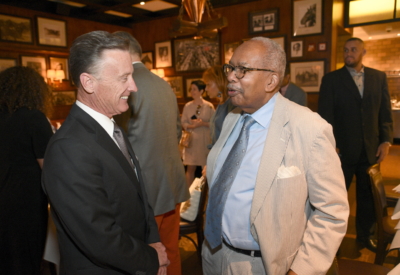
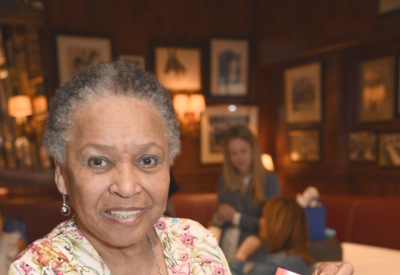
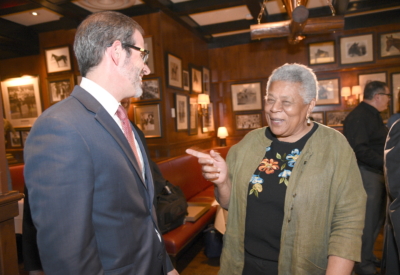
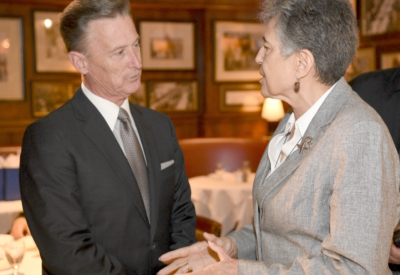
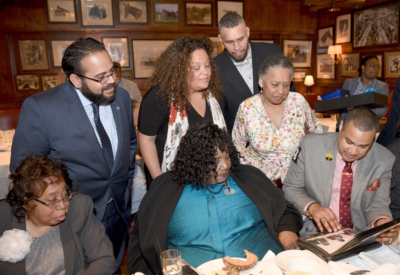
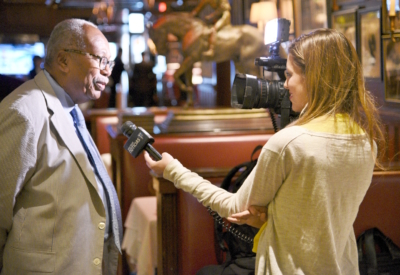
Ward recalled some of the activities the union arranged for the Little Rock Nine during their visit to New York, some of which are recounted in this edition of Hotel Voice. He concluded by repeating the words of New York’s legendary U.S. Senator Jacob Javits, who sent a telegram to the union on the evening the Little Rock Nine were saluted in our auditorium. Javits’ message said:
“Your example has inspired the world. Its dignity, its modesty and its truth have made their impact upon all people who love liberty and justice and those who know how to practice it best. Though so young, you are singularly blessed to have already made an historic contribution to the dignity of man and the mutual respect of one person for another without regard for race, creed or color.”
Ward concluded by saying, “Sixty years ago the Little Rock Nine were recognized by our union for their courage and determination. We are very happy to welcome them back to New York and recognize them once again for the bravery and dignity they displayed under the most trying of circumstances.”
Ward was followed by Ernest Green, one of the Little Rock Nine, who said, “I will never forget what the hotel and restaurant workers did for us in 1958; none of us will. After what we had been through in Little Rock it was so encouraging to find such strong support in New York.”
“It was an amazing time for us,” Carlotta Walls LaNier, another member of the Little Rock Nine, told Hotel Voice during a visit to our union in 2007. “There are things that stick in your mind forever and my time spent with your union is one of them.” Mrs. LaNier added. “Later on, I even ended up working at the union for a summer to earn money for college.”
The Little Rock Nine’s 1958 visit to our union hall and our city is remembered in LaNier’s outstanding book, “A Mighty Long Way.”
Gloria Ray Karlmark, another member of the Little Rock Nine, told Hotel Voice at the recent luncheon, “You have no idea what your union did for us in 1958. After a year of turmoil and chaos, your union brought us to New York and gave us the chance to just be kids, which is exactly what we were at that time. We were so grateful!”
Minnijean Brown-Trickey echoed the remarks of LaNier and Karlmark. “I remember that trip to New York in 1958 so vividly,” she said at the luncheon. “We were treated with dignity and kindness and it was a far cry from what we had experienced in the year leading up to our visit here. We were so appreciative.”
Ernest Green had some words of praise for today’s members as well. “You can tell your members I know how hard they work,” Green said at the luncheon. “When no one would hire us for summer jobs in Little Rock your union found me a job as a hotel houseman here in New York. I know firsthand how hard hotel work is.”
But the hard work was worth it to Green, he told the New York Daily News in 2010. “I got to listen to Miles Davis and Thelonius Monk that summer, and I loved it.”
The recent visit to New York was in conjunction with an Off-Broadway performance of a play, “Little Rock,” which had a two-week run at the Sheen Center in lower Manhattan. The play details the struggles the Little Rock Nine endured to receive the education to which all are entitled. Hotel Voice will notify members if the play returns to the city.
“While looking back and praising the courage and the accomplishments of the Little Rock Nine none of us should forget that the fight goes on,” Ward said at the luncheon. “That’s why our union was in Memphis in April to observe the 50th anniversary of the assassination of Dr. King. That’s why our union is a part of today’s fight for voters’ rights. That’s why our union continues the battle for immigration reform. And that’s why are union is so proud of our association with the Little Rock Nine.”
Meet the Little Rock Nine
The Little Rock Nine returned to Central High School in 1997.
They didn’t start out being known as the Little Rock Nine but now they are in America’s history books together and they will serve as an inspiration for generations to come. Here, 60 years after the nine brave young students were brought to New York and honored by our union, are small summaries of what they accomplished and what they are doing today. They fought hard to have the opportunity that an education could provide to them and, as you will see at the bottom of the next three pages, they used that education well:
Ernest Green In 1958, Ernest Green became the first black student to graduate from Central High School, and the Reverend Martin Luther King, Jr. attended his graduation. He graduated from Michigan State University at the top of his class and served as Assistant Secretary of Labor under President Jimmy Carter. He later became a managing partner and vice president of a major investment firm in Washington, D.C.
Elizabeth Eckford Elizabeth Eckford’s uncle, Scotty Eckford, was the Recording Secretary of Local 6 in 1957. She is the only one of the Little Rock Nine still living in Little Rock. She made a career of the U.S. Army that included work as a journalist. In 1974, she returned to the home in which she grew up and raised two sons and practiced her career as a social worker.
Jefferson Thomas The only member of the Little Rock Nine who is deceased, Mr. Thomas graduated from Central High School in 1960. He received a BA in Business Administration and also served in the U.S. military in Vietnam. He narrated the United States Information Agency’s 1964 film, Nine from Little Rock. In the film, Thomas said, “If Little Rock taught us nothing more, it taught us that problems can make us better. Much better.” He later served as an accountant with the U.S. Department of Defense. Regrettably, he died from pancreatic cancer in 2010.
Dr. Terrence Roberts Following the historic year at Central High School, Dr. Roberts’ family moved to Los Angeles where he completed high school. He earned a Master’s degree in social welfare UCLA and a Ph.D. in psychology from Southern Illinois University. He later taught at UCLA and Antioch College, serving as co-chair of the Master of Arts in Psychology program at the latter. He is a clinical psychologist. He retired from teaching in 2008 and today heads a consulting firm.
Carlotta Walls LaNier One of only three of the nine who eventually graduated from Central High School, she and Jefferson Thomas returned for their senior year in 1959. She graduated from Michigan State University and lives in Englewood, Colorado, where she is works in real estate. Her highly acclaimed memoir entitled “A Mighty Long Way” has a section that remembers her visit to New York and her positive experiences with Local 6 and the Hotel Trades Council.
Gloria Ray Karlmark She graduated from Illinois Technical College and received a post-graduate degree in Stockholm, Sweden. She was a prolific computer science writer and at one time successfully published magazines in 39 countries. Now retired, she divides her time between homes in Amsterdam, The Netherlands, and Stockholm, where her husband’s family lives.
Minnijean Brown-Trickey She was expelled from Central High in February, 1958, after several incidents, including dumping a bowl of chili on one of her antagonists in the school cafeteria. She moved with her husband to Canada during the Vietnam War protests of the 1960s and today is a writer and social worker in Ontario. She received a Master of Social Work degree at Carleton University in Ottawa. President Bill Clinton appointed her as a Deputy Assistant Secretary of the Department of the Interior responsible for diversity.
Thelma Mothershed-Wair She received her undergraduate degree from Southern Illinois University Carbondale in 1964 and earned her Master’s Degree in Guidance and Counseling and an Administrative Certificate in Education from Southern Illinois University Edwardsville in 1970. She made a career of teaching and spent 28 years teaching and guiding students in East St. Louis, Illinois. After retiring from teaching she served as a volunteer in a program for abused women in Belleville, Illinois.
Melba Pattillo Beals She earned a Master’s Degree in journalism from Columbia University and is an author and former journalist for People magazine and NBC. Her book, Warriors Don’t Cry chronicles the events of 1957 during the Little Rock crisis, based in part on the diaries she kept during that period.


